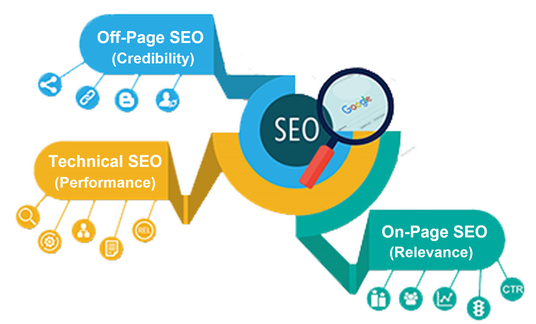|
3/14/2023 0 Comments What Is SEO? Search Engine Optimization is the process of improving your website to increase its visibility in Google, Microsoft Bing, and other search engines whenever people search for goods, services or information on topics that your organization has expertise or authority. What you’ll learn in this guide:
Why SEO is ImportantWhenever people want to go, do, find, research or buy – their journey usually begins with search. In fact, 53% of all website traffic flows from organic search results. Want to know something, Google it. Smart marketers build search relevancy so that they can engage users across a myriad of search, social and retail platforms as they begin their customer journey. How SEO WorksHow SEO Works SEO works through a combination of people, processes, technology and activities working in unison to provide search engines with the information they need to view your site as expert, authoritative, and trustworthy. Search engines perform four core functions to produce page results:
The SEO ProcessSEO is a journey, not a destination. Your search results are dependent upon feeding major search engines relevant information fast from credible sources so that search engines view you (your site) as experienced, expert, authoritative and trustworthy. Effective SEO involves three disciplines:
Technical and on-page optimizations are directly controlled by you. Off-page SEO is a different animal because you can’t control the content that other sites publish. Technical optimization Job one for SEO is technical optimization. This begins with site architecture that makes it easy for search engines to discover and access all of the content on your pages (text, images & videos). Properly indexed sites allow search engines to crawl and capture and organize your site so that it returns relevant search engine page results. User experience is also a critical element of technical optimization. Search engines stress the importance of pages that load quickly and provide a good user experience. Elements such as Core Web Vitals, mobile-friendliness and usability, HTTPS, and avoiding intrusive interstitials all matter in technical SEO. On-page optimization People and search engines are your primary audience. Your site must be optimized for both. Effective SEO optimizes the content your audience sees (what’s actually on the page) as well as what search engines crawl (the code). Publishing high-quality content congruent with your audience’s wants and needs, and that follows Google guidance, ensures that your content your experience, expertise, authority, and trustworthiness as perceived by search engines. For people, content must be:
Off-site optimization Working to influence content that you do not control is a significant challenge for any organization. Managing your listings and reviews is the best place to start. Listings are free NAP citation (Name-about-place) such as Google Places, Yelp, Bing Places, etc. Reviews are another tactic that you can directly influence. There are four core off-site tactics:
Organic SEO VS Paid SearchOrganic SEO Versus Paid Search SEO stands for Search Engine Optimization and its objective is to ensure that your site attracts visitors through relevant search results. SEO results occur organically because your site is optimized for search engines. SEO is vital and sustainable – traffic continues without additional spending.
It’s important to think of SEO and PPC as complimentary marketing channels. SEO is foundational providing long-term traffic without exponential cost. PPC is an effective tool for as long as your budget allows. When your paid campaign ends, so does the traffic. And, the more aggressive your competition – the more expensive your cost to be competitive. SEO PlanningSEO Planning Effective SEO is based on clear objectives and adhering to a long-term action plan to reach them. Remember, SEO is a journey rather than a destination. It’s ideal to think of your strategy as an endless road trip. The path you take will evolve over time – but your goal should remain clear and unchanged. Your SEO plan may include things such as:
Turn ideas into effective SEO actions through research such as:
Because code is intangible, many organizations wrongly think of websites as static objects and struggle to allocate the resources required to maintain an effective site. The same is true for your SEO. Consistently improving your SEO is dependent upon analyzing, assessing, and reporting performance. You need to know if traffic drops to a critical page, pages become slow, unresponsive or fall out of the index, your entire website goes offline, links break, or any other number of potential catastrophic issues. There are a variety of resources to help you make data-driven decisions such as Google Analytics, Google Search Console and Bing Webmaster Tools. Performance reporting should be reviewed at meaningful time intervals, typically comparing to previous report periods and tell the story of your customer journey. Monthly reporting is ideal for information sites. E-commerce sites should consider weekly performance measures. ConclusionOur digital world is ever-evolving. Search engines, user behavior and your competitors are always changing. Websites change, become stale and break over time. There is always an action you can take to improve your results. Or, as Chris Lowers put it, ‘SEO will only end when our competition dies.’
If you found this page via a search engine, you likely searched for ‘what is SEO’ or ‘how does SEO work’. This article is published by Grey Partners, an authoritative digital marketing company with solid expertise on and experience in the topic of SEO since 2009.
0 Comments
Leave a Reply. |
Archives
May 2024
CategoriesAll Accessibility Ai Analytics Branding Company News Cybersecurity Design Digital Marketing Direct Mail E-A-T Email Google GSA Approved Hosting How To Industry News LLM Marketing Press Release Product Review ROI Search Seo Tag Manager Tracking UI UX Website Website Builder |
|
Grey Partners
1611 S. Utica Ave., Ste. 508 Tulsa, OK 74104 |
-

 RSS Feed
RSS Feed
